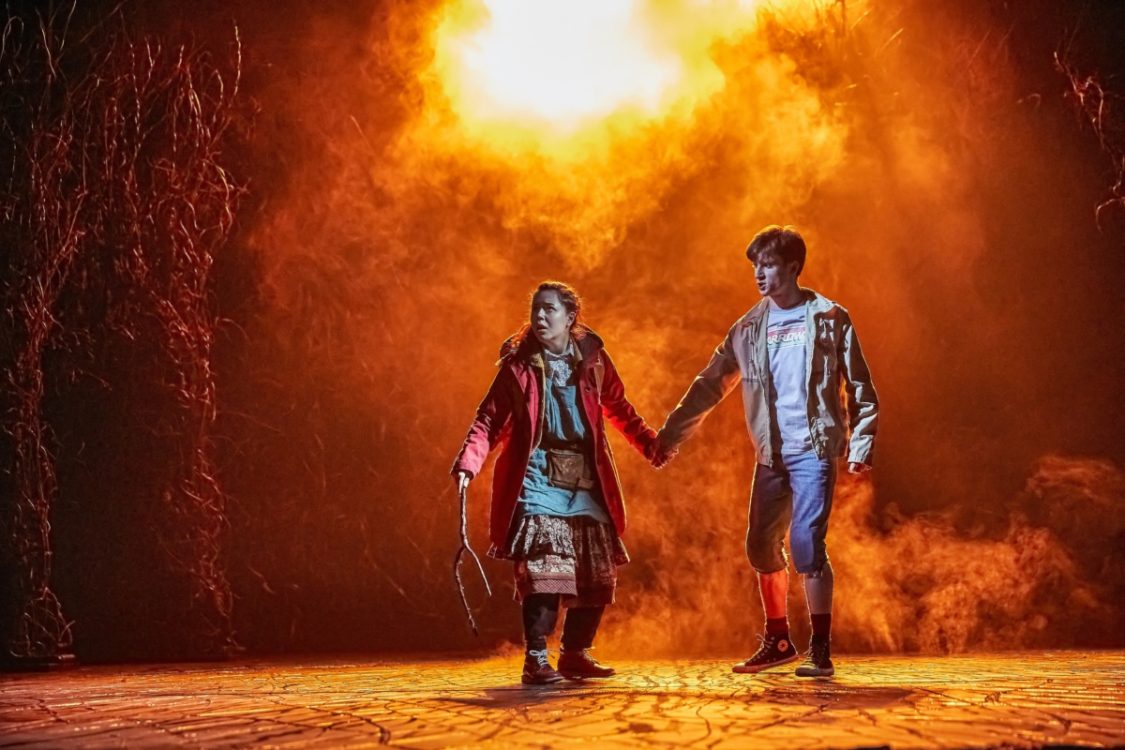A child’s fight against the prospect of growing up has always been fertile ground for fantasy stories. But I don’t think I’ve ever seen it put to such good use as it is in Neil Gaiman’s The Ocean at The End of The Lane.
The play, adapted by Joel Horwood from Gaiman’s 2013 novel, follows an unnamed protagonist (Trevor Fox) as he recalls a lost memory in which, as a boy (Keir Ogilvy), he was thrust into another realm.
After the suicide of their lodger, the boy’s understandable shock is not dealt with well by his sometimes harsh, but mostly well-meaning father (also Trevor Fox). He explains away the death as simply a product of ‘real life’.
This traumatic event marks the young boy’s first step on his path into adulthood. So naturally, he retreats into fantasy.
Charlie Brooks is pitch perfect as Ursula, an evil monster in human form who has crossed over from the hellish pits of another world. I have to confess, in one scene, I felt an actual spine-tingling chill as she hovered menacingly over the stage. Admittedly, this may be due to some unresolved trauma I have as a result of her Eastenders character having killed-off Danny Dyer at Christmas. (I’m still not over it.)
Keir Ogilvy is also delightful in the role of the young boy, who plays him like a frantic, adolescent Arthur Dent. It did take me a while to warm to the mystical Hempstock family though. This is no fault of the cast, Millie Hikasa, Kemi-Bo Jacobs and Finty Williams all deliver committed performances, but I found their exaggerated characters to be initially grating, as if they’d been instructed to play them like a bunch of especially goofy town criers.
But these over-the-top, cross-dimensional beings were ultimately endearing, particularly Millie Hikasa’s Lettie, who won me over with her down-to-earth wit and displays of genuine affection for the boy. She owns a standout fight scene (a captivatingly choreographed sequence/ hypnotic kind of dance break?) in which she defeats an impressive puppet monster from the ‘other realm’… or perhaps, the ‘upside-down’…
On that – the piece does little to disassociate itself from accusations of ‘jumping on the Stranger Things bandwagon’. Its lead poster is clearly inspired by the Netflix phenomenon’s marketing and the production even has an 80’s-style synth-infused soundtrack. Not to mention the alternative dimension and monsters with the ability to take on human form. And of course, there’s Lettie, the teenage girl with the supernatural skills to stop them…
I feel like I might be in danger of upsetting some Gaiman stalwarts here, so I should say that I understand that the novel came first – so it’s the Duffer Brothers who are more likely to be the real copycats. But this adaptation did emerge in the wake of the Netflix hit, so I think it’s no coincidence that the main aesthetic of the production seems to be aiming for ‘Stranger Things: UK’.
Not that any of this is a problem: I’m all for it!
This is blockbuster theatre. Katy Rudd’s production more than matches the scale of the young boy’s imagination. The stagecraft is sensational, particularly the use of multiple doorways, lit in such a way as to create the illusion of the door being uncannily distant from the frame. These are later manipulated by Ursula who – with the help of a double – appears from multiple points of the stage at seemingly impossible speed. And there is an immersive use of the ocean itself – which acts as a middle ground between worlds – at one point, it quite literally floats over the audience’s heads.
This is a story that not only celebrates the joy of a child’s limitless imagination, it goes one step further and suggests that seemingly frivolous and forgotten fantasies of our youth may hold the key to understanding the realities of adult life.
In later years, the grown boy finds himself returning to the ‘ocean’ at moments of personal crisis. Perhaps, momentarily, he indulges in his childish fantasies to cope? Imagination can influence reality, as Lettie explains: anything ever invented was first thought.
It’s pure entertainment that more than holds its own against the streaming giants that it arguably draws inspiration from. It’s a complete spectacle from start to finish and a fine example of just how thrilling live theatre can be.

